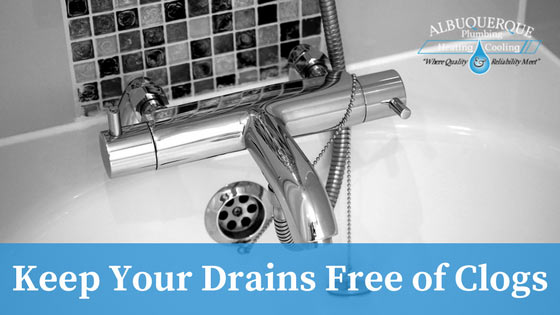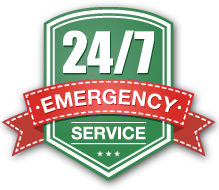
At Albuquerque Plumbing, Heating & Cooling, we’re dedicated to helping our customers maintain a safe and efficient plumbing system. A part of this task is knowing what should never find its way into your drains. Whether it’s the kitchen sink or the bathroom pipes, understanding what’s drain-safe is essential to avoid costly plumbing issues. Our knowledgeable plumbers will guide you through the dos and don’ts of what can safely go down your drains, ensuring your plumbing remains problem-free for years to come.
What To Avoid Pouring Down Your Drain
Not all items instantly clog your drains, but clogs can accumulate over time and wreak havoc on your plumbing system. Here’s a list of substances you should always avoid putting down the drain:
- Grease: Fats, oils, and grease are notorious for kitchen plumbing problems. When they cool down, they congeal and quickly clog pipes. Collect them in containers and dispose of them in a garbage can.
- Starchy Food: Items like rice, pasta, and oatmeal can swell and create blockages when poured down the drain. Always scrape these foods into the garbage before rinsing your dishes.
- Flushable Products: Despite claims on some packaging, items like feminine hygiene products and baby wipes can still clog your drains. It’s best to throw them in the garbage instead of flushing them.
- Paint: Paint can immediately clog and damage your pipes. Never rinse it down the drain; follow the product label’s safe disposal methods.
- Eggshells: Despite their harmless appearance, eggshells can get trapped in other debris, leading to clogs in your pipes.
- Coffee Grounds: Coffee grounds are a common culprit for kitchen sink clogs since they are abrasive and do not grind properly in the garbage disposal.
- Medication: Flushing unused medication doesn’t always clog drains, but it can contaminate your water supply. Protect your household and the environment with proper medication disposal.
- Paper Products: Refrain from flushing anything other than toilet paper down the toilet. Paper towels, sanitary products, and packaging can cause clogs requiring professional assistance.
- Fibrous Veggies: Tough-shelled vegetables like pumpkin or corn husks can quickly clog your kitchen sink. Dispose of them in the trash or compost.
- Chemical Cleaning Products: Harsh cleaning products don’t always clog drains, but they can damage pipes and pose health hazards. Follow the disposal instructions on the cleaning product labels.
- Flour: Avoid putting flour down your drain, as it can expand to a dough-like consistency that causes clogs.
It’s important to remember that even everyday items can cause pipe blockages, so always think twice before pouring a substance down your drain.
Safe Vs. Harmful Items
Not all substances are detrimental to your drains. Some can help you maintain clean and healthy pipes. Here are some common items you might wonder about pouring down your drain:
Alcohol
In small amounts, alcohol is generally safe to pour down the sink. But if you need to dispose of large quantities, consider diluting it to avoid straining your pipes.
Vaseline
While not as bad as grease, Vaseline (petroleum jelly) can still cause clogs and requires proper disposal.
Milk
Spoiled milk is not necessarily harmful to pipes and drains, but it can harm the environment when poured down the drain. It’s best to toss expired milk in the dumpster instead.
Antifreeze
Never pour antifreeze down the drain. The ethylene glycol in antifreeze can harm your water supply and pipes. Dispose of it safely according to the proper procedures.
Paint Thinner
Avoid pouring paint thinner down your drain. Like antifreeze, it is harmful to pipes and your water supply. Always follow safe disposal methods for paint thinner and other mineral solvents.
Ammonia
Ammonia is water-soluble, and you can pour it down the drain. However, diluting it with plenty of water is essential. Avoid mixing ammonia with other household products when draining it.
Coke
Some sodas like Coca-Cola can clean pipes due to their phosphoric acid content. The acidity helps remove buildup in your drains.
Vinegar
Besides Coke, a more effective cleaning remedy is vinegar. It is natural, safe, and beneficial for your drains. Use vinegar to break down clogs and harmful bacteria that cause foul odors.
Boiling Water
Boiling water is usually safe to pour down drains, but ensure you do not have old and damaged pipes. Hot water can degrade the plastic seals on old piping.
Identifying Mainline Clogs
While a clogged sink drain might seem simple, it’s crucial to recognize when it is a more severe issue: a mainline clog. A blocked main sewer line can cause property damage and water contamination. Be on the lookout for the signs of this significant plumbing concern:
- Sewage Backup: When water cannot flow through a blocked main sewer line, sewage or wastewater escapes elsewhere, such as the sewer cleanout or floor drains.
- Multiple Clogged Drains: If multiple drains clog simultaneously, you may have a mainline blockage. Other signs include gurgling drains, slow drainage, and foul odors throughout your property.
- Water Backup: If you notice water backup in the shower when flushing the toilet, it means displaced wastewater has nowhere else to go. A mainline clog can also cause the toilet to overflow when running the dishwasher or washing machine.
If you encounter these symptoms of a mainline blockage, it’s not the time for do-it-yourself fixes. This is a severe plumbing issue requiring the help of our professionals at Albuquerque Plumbing, Heating & Cooling. Call us soon to address the problem and protect your home.
Frequently Asked Questions
Explore these common questions about maintaining clean drains, or reach out to us for additional tips and assistance:
1. Does mixing baking soda and vinegar clean drains?
A mixture of vinegar, baking soda, and hot water can be a helpful cleaning solution for clogged drains. Although it is not a long-term fix, this remedy can remove minor sink blockages.
2. Should you use salt down your drain?
Salt’s abrasive qualities may help in breaking down grease and fats. However, it is not that effective in removing clogs by itself. Combine salt with vinegar and hot water to help clear your pipes.
3. How do I eliminate foul drain odors?
To get rid of unpleasant smells in your sink, try a combination of baking soda and vinegar, a soap and water mixture, or boiling water with citrus. The crucial part is cleaning all buildup from the drain, often the root cause of foul odors.
Contact Albuquerque Plumbing, Heating & Cooling Today
At Albuquerque Plumbing, Heating & Cooling, we have helped numerous homeowners unclog their pipes and drains. Our plumbing services include professional drain cleaning that removes tough clogs. We also offer routine visits, preventing blockages from occurring in the first place. So, won’t for your drains to clog; contact us today to schedule a drain cleaning appointment. We’re here to keep your plumbing running smoothly!
If you’re looking for fast and reliable drain cleaning, then check out our services in the following locations:
- • Albuquerque drain cleaning
- • Bosque Farms drain cleaning
- • Corrales drain cleaning
- • Los Ranchos drain cleaning
- • Placitas drain cleaning
- • Rio Rancho drain cleaning
Looking for help in California? Check out our Friends over at Ace Pelizon Plumbing! For more information, click a link below!



